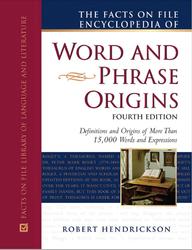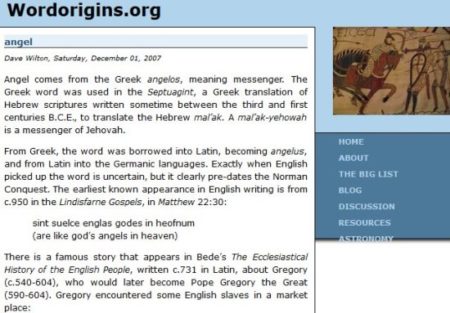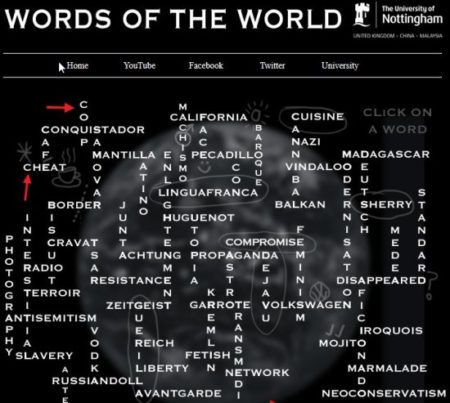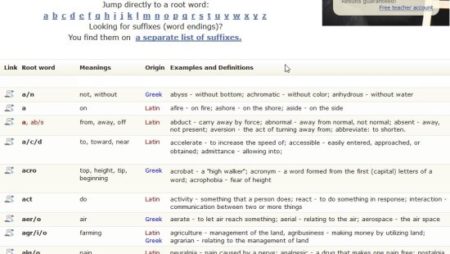The Facts on File Encyclopedia of Word and Phrase Origins, Hendrickson R., 2008.
In writing, or compiling, this book, I have again tried to include as many new selections as possible, if only to make it one of the most complete American works on the subject (15,000 entries and still counting). The fabulous Oxford English Dictionary, however, still far outdistances any contender in the field, covering some 600,000 words and phrases and taking a full 40 years to produce. No doubt those tenacious O.E.D. people will be doing the same thing again a century from now.
A.
Abelia. A plant genus of the honeysuckle family that was named for British physician and plant collector Dr. Clarke Abel, including some 80 ornamental shrubs that are found across the Northern Hemisphere from eastern Asia to Mexico. Abelis schumannii is a species of Abelia named for Dr. Karl Schumann, a 19th-century German botanist, and is one of the many plants bearing both genus and species human family names.
Abe Lincoln bug. Anti-Lincoln feelings died hard in the South after the Civil War, as the name of this little bug shows. Even as late as 1901 this foul-smelling insect, also known as the harlequin cabbage bug, was commonly called the Abe-Lincoln bug in Georgia and other Southern states. See also LINCOLNDOM.
CONTENTS.
Preface to the Fourth Edition.
Preface to the Original Edition.
Abbreviations for the Most Frequently.
Cited Authorities.
Entries A-Z.
Index.
Бесплатно скачать электронную книгу в удобном формате, смотреть и читать:
Скачать книгу The Facts on File Encyclopedia of Word and Phrase Origins, Hendrickson R., 2008 — fileskachat.com, быстрое и бесплатное скачивание.
Скачать pdf
Ниже можно купить эту книгу по лучшей цене со скидкой с доставкой по всей России.Купить эту книгу
Скачать
— pdf — Яндекс.Диск.
Дата публикации: 02.10.2022 06:26 UTC
Теги:
учебник по английскому языку :: английский язык :: Hendrickson
Следующие учебники и книги:
- С английским за границу, Клементьева Т.Б., 2009 — Данное пособие предназначено для всех выезжающих в англоговорящие страны. Оно содержит информацию языкового и культурологического характера, разбитую на 11 тем. … Книги по английскому языку
- Business English Language Practice, Low S., Pile L. — The DELTA Business Communication Skills series uses a learner-centred approach to develop key communication and language skills essential for today … Книги по английскому языку
- Английская грамматика с человеческим лицом, Комиссарова К., 2009 — Это Грамматика для тех, кто только начал осваивать английский язык. В ней постепенно, шаг за шагом, по мере нарастания сложности … Книги по английскому языку
- Английский язык, Уроки чтения, 1-4 классы, Сушкевич А.С., Маглыш М.А., 2009 — Пособие предназначено для обучения чтению детей, начинающих изучать английский язык. Оно может быть использовано учащимися общеобразовательных школ как справочник по … Книги по английскому языку
Предыдущие статьи:
- Английский язык, Разговорные формулы, диалоги, тексты, Осечкин В.В., 2008 — Пособие призвано помочь понять структуру разговорных формул и специфику их употребления. Работая шаг за шагом над разговорными формулами и, особенно, … Книги по английскому языку
- Company to Company, Student s Book, Littlejohn A., 2008 — For the fourth edition of Company to Company, both the Student’s Book and the Teacher’s Book have been completely reset … Книги по английскому языку
- Activating 1001 Academic Words for IELTS, Keith B., 2007 — The course is designed to teach you quickly and easily the language you need for success in IELTS and similar … Книги по английскому языку
- Common mistakes at IELTS Intermediate and how to avoid them, Cullen P., 2007 — How can you avoid the most common mistakes students make at IELTS Intermediate? Based on analysis of thousands of exam … Книги по английскому языку
196
Previews
8
Favorites
Purchase options
Better World Books
DOWNLOAD OPTIONS
No suitable files to display here.
14 day loan required to access EPUB and PDF files.
IN COLLECTIONS
Books to Borrow
Internet Archive Books
Delaware County District Library (Ohio)
Uploaded by
sf-loaders@archive.org
on June 21, 2011
There are several words and phrases that might seem confusing when you read them, but they have a deeper meaning and context. Let us try and understand the origin of words and phrases in the article that follows.
It’s raining cats and dogs…
Saving for a rainy day…
In the limelight…
All these phrases make perfect sense to you, correct? Even though they seem rather preposterous and make absolutely no sense if you start dissecting them. For example what is the meaning of ‘raining cats and dogs’? Is it a literal occurrence of cats and dogs falling from the sky? Obviously not. These catchy phrases are used to depict a concept. Raining cats and dogs means that it is raining very heavily. But how did this concept come about? It’s not just these phrases that I’ve mentioned above, but several others as well which have become a part of our daily language. What is the origin of words and phrases and how did they come to be? Here is a list of some of the most popular, widely used phrases in the English language. You’ll find that some of the origins that are mentioned below have rather surprising whereabouts.
Breaking the Ice
What it Means
To initiate something; as in a project or speech.
How it Originated
When rivers froze over, they prevented people living on the opposite banks from carrying out any trade. This meant a loss in business. Until the time specially created small and sturdy ships called icebreakers were introduced into the frozen river with the objective of breaking the ice and thereby allowing the bigger ships to cross over and carry on trade. As the years passed, the term icebreakers came to be synonymous with initiating something new.
Beating Around the Bush
What it Means
To not approach something directly.
How it Originated
In the olden era, hunting used to be carried out in a specific manner. The hunters used to hire men to go into the forest and enter the habitats of the animals, then beat the branches and make a ruckus so that the animals would get scared and run towards the hunters. This practice was not followed in case of hunting for wild boars because they were considered to be very dangerous. Instead, the workers would circle the bushes around the habitat and not enter the habitat directly. Thus the term ‘beating around the bush’ came to mean that a point was not reached at directly.
No Spring Chicken
What it Means
People or things that are not in their prime anymore.
How it Originated
Chicken farmers in New England realized that the chicken that were born in spring fetched a better price than those who had lived through the winter. When they tried selling the old stock, the customers often complained that the stock was ‘no spring chicken’.
Bikini
What it Means
A two piece swimsuit for the ladies that shows a lot of skin.
How it Originated
In 1946, an atomic bomb test was conducted at the Marshall Islands and they were more commonly referred to as the ‘Bikini Island Bomb Tests’. A year later, the first two piece swimsuit went on display and the reaction of the male populace to this clothing was on the same lines of the atomic bomb-explosive. Due to the similarity in the reactions, the swimwear was named the Bikini for promoting sales. In a few years the name became synonymous and has stayed on.
Bring Home the Bacon
What it Means
Bringing home money that has been earned through a lot of hard work.
How it Originated
County fairs held contests where contestants would have to catch greased pigs to win a prize. Since the contest centered around pigs, the term came to be known as ‘brought home the bacon’.
Sweetheart
What it Means
Someone who gets your heart thumping.
How it Originated
In the olden times when doctors knew not much about the human circulatory system, often drew parallels between the heart and the personality of a person. Thus terms like soft hearted, hard hearted etc came to be. Similarly the term ‘swete hert’ was used to describe a fast beating heart. Since our heart starts beating faster when we are in love, the term slowly came to be known as ‘sweetheart’ to describe a person who gets your heart to beat faster.
Blockbuster
What it Means
Anything that makes a huge impact. In colloquial terms, it is generally used in terms of films.
How it Originated
During World War II a special bomb was produced that had such impact that it could level a full block of buildings or houses. The term then became synonymous with anything that made an impact at such resounding levels.
To Paint the Town Red
What it Means
Having a good time in a particular place.
How it Originated
In the olden times, the male populace visited the red light districts for fun and excitement. This phrase came to be coined to represent that they were having a good time. Today however, it has no sexual connotation to it.
Wrong Side of the Tracks
What it Means
From the bad side of a town. Usually refers to the lower class of people.
How it Originated
Trains of the olden era were not very advanced, such that they expelled soot as they moved on the tracks. The thick black soot only moved in one direction and affected the habitat of people who did not have the money to live in wealthy homes and protect themselves. Thus they lived on the ‘wrong side of the tracks’ and had to suffer for it.
Hanky-Panky
What it Means
Anyone who is dealing in some underhanded business or fooling around. It could be a sexual connotation or just otherwise.
How it Originated
Magicians often used a hanky to distract their audience from the main trick. So the term hanky came to be. The panky was added as a rhyme and together the term hanky-panky was coined. It came to be known for something that was done in the sly.
Chocolate
The Aztecs made this drink and called it choco-atl. The Spanish could not produce the ‘tl’ sound in ‘atl’ and mispronounced it chocolato which then came to be known chocolate in the English language.
Barbecue
The word has Caribbean origins. The original meaning is that of a raised platform made of wood, used for drying or sleeping. It was known as ‘babracot’ or ‘barbacoa’ in Guiana and Haiti. The word was brought to the English language by the Spaniards and it came to be known as barbecue.
Bimbo
The word comes from the Italian word ‘bambino’ which means a baby. Meaning someone who has low intelligence.
Algebra
The word comes from the Arabic book ‘ilm al-jabr wa’l muqabalah ‘ which means the science of transportation and cancellation and was written by a prolific mathematician called Mohammad al-Khwarizmi in Baghdad. The phrase ‘al-jabr’ was used to form the term algebra.
Checkmate
The word comes from the original Farsi (Persian) word Shah-k-mate, literally meaning ‘The king is dead’. The French turned the SH into CH and the word checkmate was coined.
Loo
This informal word for the toilet has 2 theories backing it’s origin. One is gathered from the French language which referred to a toilet as ‘Le leiu’ or ‘the place’ as a euphemism and the second is that the iron cisterns that were placed in the British outhouses had the name ‘waterloo’ on them and that’s how the name came to be.
Paparazzi
The word is fairly recent and is taken from the film ‘La Dolce Vita’, in which a character called Paparazzo would go to any length to take celebrity pictures. The word paparazzi comes from the Italian surname Paparazzo.
Reading about the origin of phrases must have taken you on a rather interesting journey of how some of the popular words and phrases came to be. It definitely makes us think about how words and phrases get added into a language and make it grow.
Many of the words and phrases we use every day are things we take for granted in terms of what they mean now. But what did they originally mean? What is the origin of «gibberish,» «spill the beans,» «best man,» or «loophole?» What are the origins of these everyday phrases and terms? Some of these might surprise you.
If you are looking for the origin of common phrases, read up! You never know the next time someone may ask you about the origin of a popular phrase. And when that happens, you, my friend, will be ready.
From ancient castle features to the dangers of having your bride stolen on your wedding day, these common phrases have their origins from some interesting sources. Below you will find out such interesting things as the jibber jabber origin, stool pigeon origin, and the etymology of common phrases and sayings. Learn where the phrases and terms you use everyday came from with this list of origin of phrases and expressions.
-
In feudal days, weddings were rife with the possibility of a rival lord trying to break up your wedding ceremony and steal your bride for political reasons. To prepare for a possible battle, the groom would ask a friend with fighting skills to stand with him during his marriage and act as his Best Man, helping to defend his bride from possible kidnapping.
Often, grooms would convince multiple friends and relatives to stand with him, and several peasant «maids» would be persuaded to stand with the bride, in the hope that if invaders came to disrupt the ceremony, they would be confused by the number of girls in party clothes, and possibly kidnap the wrong one.
-
The origin of this phrase goes back to when pigeons were considered a good food source. Hunters would take a tame pigeon and tie it to a stool in order to attract its wild brethren. Because the pigeon that was tied to the stool was used to trap others of its kind, the term «stool pigeon» became used to describe anyone used to sell out his friends.
-
In ancient Greece, some voting was done with beans. White and black beans were used to determine the nature of your vote. Citizens would cast their votes with the bean color for their choice and drop it in a jar to be counted by the officials later. However… as one might expect… on a few occasions a clumsy voter would knock over the jar and reveal the beans and the outcome of the vote. The phrase came to refer to someone who reveals the truth or hidden secrets.
-
Today, this word implies a way to get out of a contract. The origin goes all the way back to the Middle Ages and, believe it or not, a defensive architectural feature of castles. Up at the top of the fortifications, designers put in small, usually oval windows that were tapered to be wider inside and narrower from the outside (also called a «murder-hole»). This made the window difficult to hit from the outside by attacking enemies, but a good spot from which to fire arrows.
This opening was called the loophole and later, the term came to represent any opening that gave an advantage to one side in an argument or contract.
-
Sacked! In today’s parlance, it means to get fired. The origin, however, is from the 17th century. Artisans used to come to work with their own tools for the job, usually carried in a sack). When an employer wanted to fire someone, all he did was hand him his sack and tell him to take his tools and leave. This phrase still has the same meaning today, only now the sack has been replaced by a cardboard box to take home one’s personal effects and office plants.
-
In the 17th century, doctors of medicine found that obtaining dead bodies for study was difficult. So difficult, in fact, that they would be lucky to get even one in their entire lifetime. Because of this, the body they obtained would be treasured and never discarded. But, obviously, society frowned on keeping corpses lying around. Doctors rectified this by keeping the skeleton in their closets. The practice was common enough that many patients just assumed that every doctor kept one hidden in there.
Eventually, the phrase came to be used for any unsavory secret that was hidden away from general public knowledge.
We use different languages worldwide to communicate with each other. Every so often we wonder where a word came from. How did a particular word start being used as a common word worldwide and where did it actually originate from. So to find this out we will explore the world of languages and origin of words in this article. This article will cover websites which will let you know the origin of a word.
The study of origin of a word is known as Etymology. You will find that often there are popular tales behind the origin of a word. Most of these tales are just tales and not true, but knowing how the word came into being is equally interesting. So let’s look at these websites to know the origin of words below.
Online Etymology Dictionary
Online etymology dictionary explains you the origin of words and what they meant along with how they would have sounded years back. You would see a date beside each word. This date represents the earliest evidence of this word being used in some sort of written manuscript. Now you can either search for a word you are looking for by typing it in the search box given at the top of the page, otherwise you can browse the words alphabetically. The website has a huge collection of words in it. You can go through the words and find out there origins and meanings as well.
Word Origins by English Oxford Living Dictionaries
Word Origins by English Oxford Living Dictionaries is a good website to know about a words origin. You can check out origin of a word or a phrase. You can search for the word or a phrase you are looking for or can even browse the page to know origin of different words. The website apart from this has a dictionary, thesaurus, grammar helper, etc. As this app has a dictionary, it proves to be a good source for knowing the origin of a word. You can see trending words when you scroll down the page. You can also subscribe to the newsletter on this website to receive updates regarding new words, phrases, etc.
Wordorigins.org
The website Wordorigins.org will let you know the origin of words and phrases. The website has a big list of words which you can go through, or even search for a particular word that you are looking for. The website also has a blog and discussion forum where people can discuss there views. You can login and become a member of the website so you receive regular updates from the website. You can either start browsing words by going to the big list words tab, or by searching for a word. The big list of words is in alphabetical order and there are about 400 words in here. Each word has a interesting story or folklore related to it.
Words of the World
Words of the World is a website which lets you watch videos to let you know the origin of a word. The website explains which language a word originated from through a video. The home page of the website will have a list of words for which you can see a video explaining how the word originated. The words on the home page are given in the format as shown in the screenshot above, but they can also be turned into a neat list if you like. The website is supported by the University of Nottingham and thus is a trusted source.
Learning Nerd
Learning Nerd is another website which has a section on English etymology resources. The website lists references to origin of words like there are word origin dictionaries listed, words with Greek and Latin roots are under a different category, words originating from around the world can be found under international words, and then there is a section for miscellaneous words. You can also play etymology quizzes and listen to etymology podcasts as well. The website itself doesn’t have much information about word origins but will redirect you to another website for your word needs.
Learn That Word
Learn That Word is another website which lists root words and prefixes. The website is pretty basic and a list of words can be seen right on the first page. The words are listed alphabetically, so you can even jump to a word that you are looking for easily. The website will list the root word, its meaning, its place of origin, and then definition and examples. This can be seen in the screenshot above.
These are the websites I found which let you know the origin of a word. Go through them and let me know which one you liked most. If you think there is a website which could be included in this article then leave a comment below.










